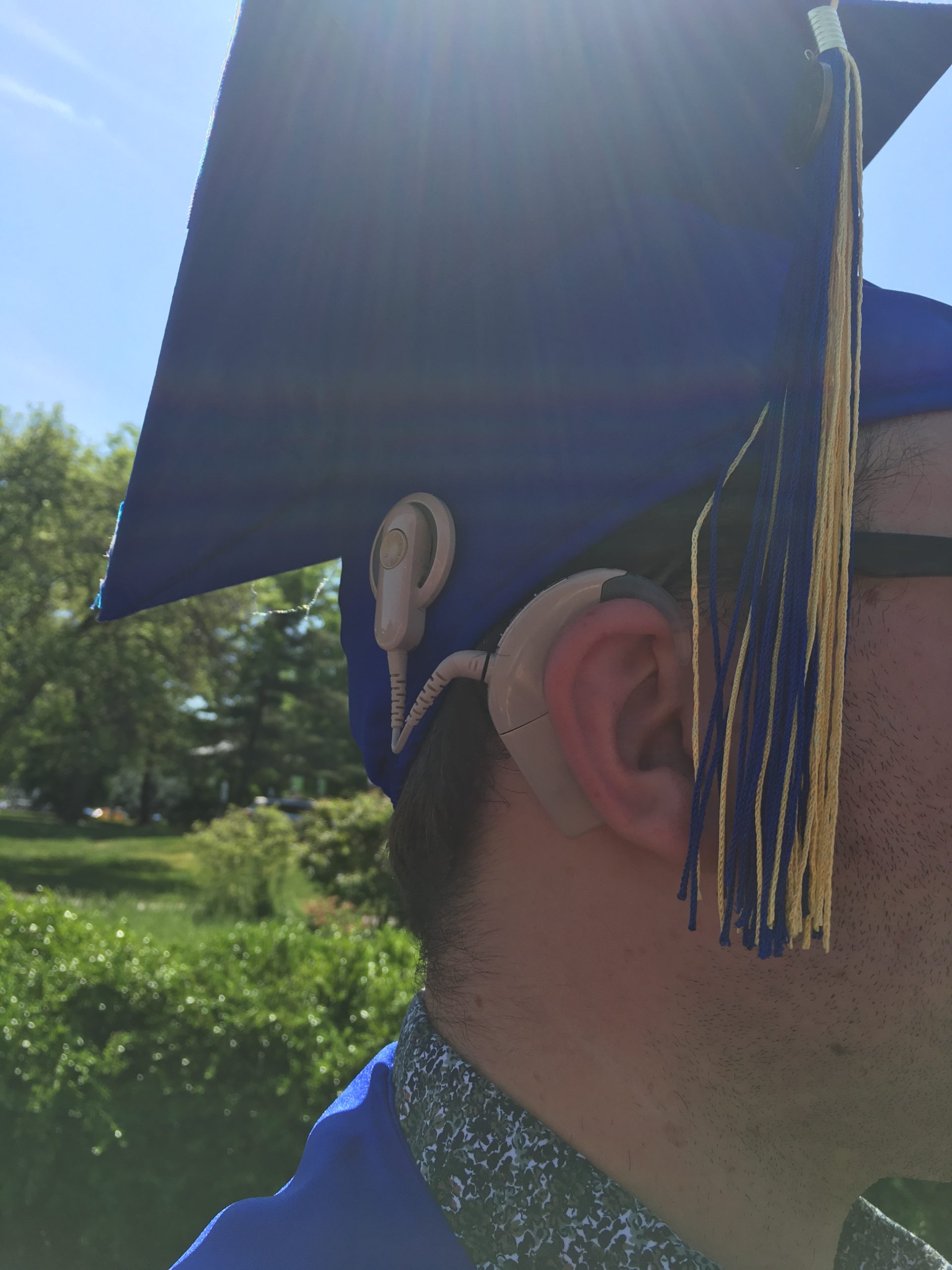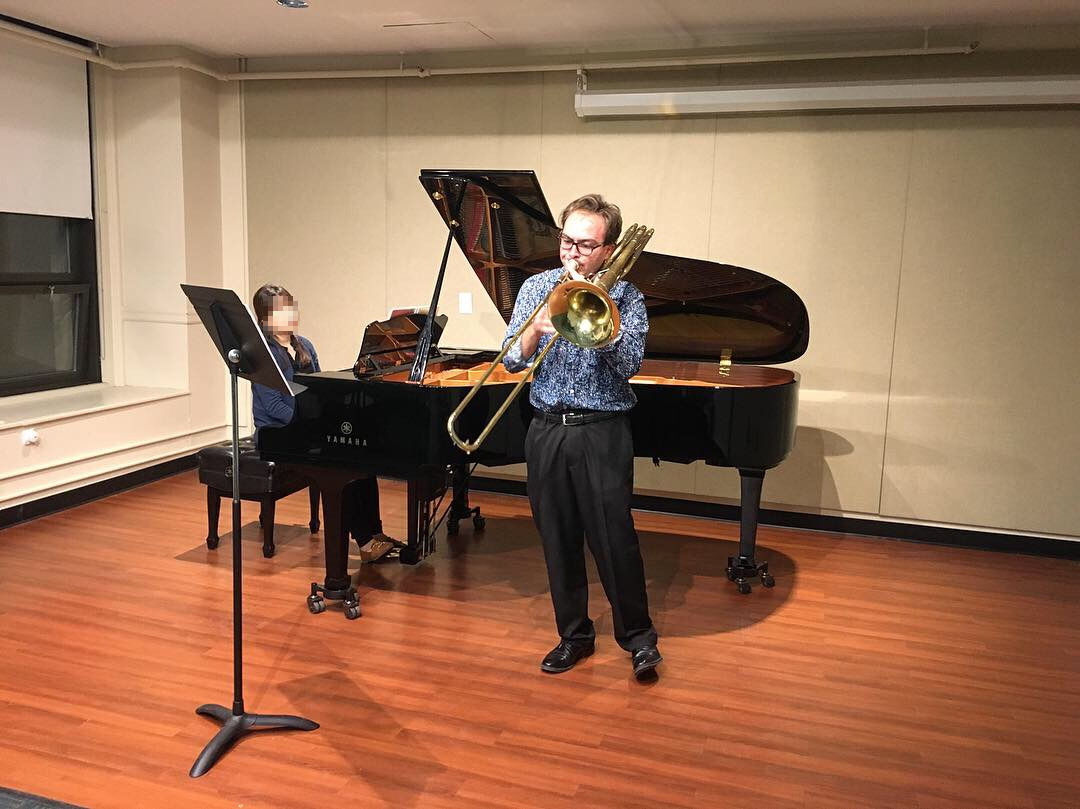Alek M. was a 5-year-old child with EVA before his hearing loss was identified. His hearing loss was managed until middle school when the decline prompted his family to explore cochlear implants. Now, a bilateral cochlear implant recipient, Alek is a talented musician and cochlear implant advocate:
“As a child, I had natural hearing. It wasn’t until I was 5 years old that I woke up without any sound in my left ear. The prognosis was an enlarged vestibular aqueduct (EVA). EVA also existed in my right ear, so my hearing would eventually decline on the other side as well.
Things were simple until middle school when my right side began to decline. My family and I decided a cochlear implant would be a smart choice the summer before 8th grade. This is when my surgeon at our local medical center performed my surgery. After one month of recovery, we turned on the device, and I was able to hear coherent sound immediately.
I had one cochlear implant through high school. By my junior year of high school, I knew I wanted to study music in college, so my family and I decided that getting another cochlear implant would be the right choice because I wanted the strongest level of hearing to be successful in music. This cochlear implant surgery was also incredibly successful, and by the end of that summer, I was hearing enough to start my music studies. Both implant mappings were done by my audiologist at our local medical center. Her understanding of what a mapping can provide for a patient has helped shape my life in a positive way.
My parents and I decided on Cochlear’s brand of implants because of their quality product and great customer service. My cochlear implants have helped me hear fantastic moments in my life like orchestra concerts and improv nights, and I feel confident in the sounds I hear. Whenever there is a problem with my equipment, the representatives I speak with are understanding, patient, and diligent about getting me the materials I need.
The importance of my cochlear implants to becoming a musician
I did my undergraduate studies at the University of Delaware where I studied Trombone Performance. There, I started at a piano and practiced hearing the pitch differences between notes within an octave and then expanded from there. During various points in my life, I would sleep listening to recordings of trombone, pitched drones or ambient speech noise. Becoming familiar with sound has been the best way for me to hear better. I also consistently sleep with at least one sound processor1 due to safety, and I believe it provides me with a clearer sound the next day. I started sleeping with my sound processors when I noticed my singing ability was better the day after wearing one to bed one night. The ‘fuzz’ on the outside of speech and pitches was absent from the usual sound, and this made things easier to hear.
 The opportunities I have experienced by being able to hear have been worth the journey. I enjoy playing my instrument very much, and I enjoyed my studies at Boston University. Without my cochlear implants, this experience would not have been possible. I feel that the quality Cochlear brings to implants shows when trying to fine-tune musical passages or listen back to recordings. Playing in an ensemble and hearing little tuning improvements is an exciting and worth-while feeling made possible with the help of Cochlear.
The opportunities I have experienced by being able to hear have been worth the journey. I enjoy playing my instrument very much, and I enjoyed my studies at Boston University. Without my cochlear implants, this experience would not have been possible. I feel that the quality Cochlear brings to implants shows when trying to fine-tune musical passages or listen back to recordings. Playing in an ensemble and hearing little tuning improvements is an exciting and worth-while feeling made possible with the help of Cochlear.
The limits I have encountered with my equipment don’t hold me back. I work at a winds and brass professional music shop where I listen to customers try out instruments and give them advice on which would suit them best, based on the way they sound. I also answer the phones, sometimes while customers are playing instruments in the store. In the past, I had issues with answering phones because I didn’t feel confident that I could hear the person on the other end, so taking this step was a huge jump for me. My experiences playing in orchestra, band, trombone quartet and octet, and performing solo works with piano have presented various challenges as well. In previous summers and winters, I worked in construction; the biggest issue was when the sound processors didn’t work after being in humidity and getting dirty, but hearing instructions was not a problem. I feel very grateful knowing that I have been able to succeed in jobs which are not ideal for cochlear implant users and I appreciate everyone who has been patient in my development. Hearing is one of my greatest joys!
In the future, I want to combine music and cochlear implant development and awareness. Using Cochlear has helped change my life, and I want to help improve it for generations to come! Hearing better helps produce better music. The more I hear and practice being familiar with sounds, the more music has meaning to me. This is the same for social interactions as well. Hearing better helps me feel more confident in large group settings or louder spaces, and I am excited to continue progressing with these devices.”
To see more of Alek’s experience with music and his cochlear implants, see his YouTube videos:
https://www.youtube.com/watch?v=7UBaCkYz0Xs&t=44s
https://www.youtube.com/watch?v=Ty0ET2neCQg&t=6s
If you want to continue to follow Alek’s journey, check out his Instagram and Facebook pages.
If you have a child with EVA and concerned about their hearing, visit IWantYouToHear.com to learn more about hearing treatment options like cochlear implants.
- Do not apply continued pressure to the coil when in contact with the skin (e.g. sleeping while lying on coil)
